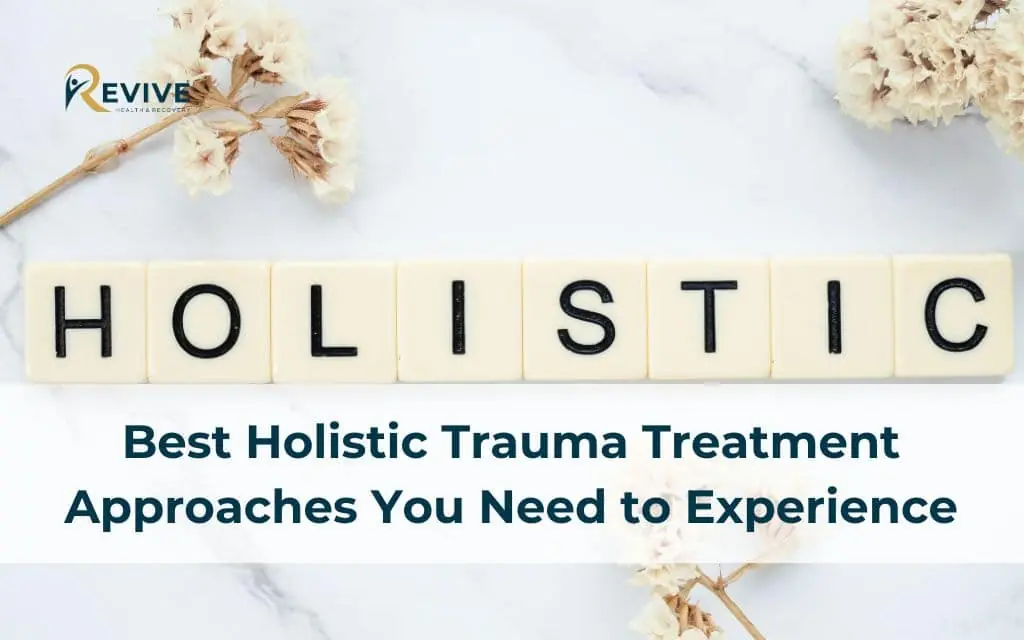Looking for natural ways to healing from trauma in Denver? Discover holistic approaches that nurture your mind, body, and spirit. Trauma recovery doesn’t have to follow just one path – many are finding success with comprehensive treatments that address the whole person.
Holistic trauma treatment approaches have gained significant popularity in Colorado, especially in Denver, where a health-conscious community embraces integrative care. This guide covers everything from understanding trauma basics to finding the right therapist, exploring costs, and starting your healing journey with trusted Denver resources like Revive Health Recovery.
Understanding Trauma and Its Effects
Types of Trauma
Trauma comes in various forms, each affecting people differently:
- Acute trauma: Results from a single distressing event like a car accident on I-25 or a hiking emergency in the nearby Rocky Mountains
- Chronic trauma: Stems from prolonged exposure to stressors such as ongoing workplace harassment in Denver’s business district
- Complex trauma: Develops from repeated, prolonged trauma, especially during formative years, such as childhood neglect or abuse
How Trauma Impacts You
Trauma doesn’t just affect your mind – it influences your entire being:
Psychological effects:
- Anxiety, depression, and panic attacks
- Post-traumatic stress disorder (PTSD)
- Difficulty forming or maintaining relationships
- Sleep disturbances common among Denver’s high-altitude residents
Physical symptoms:
- Chronic muscle tension and pain
- Digestive issues and immune system suppression
- Fatigue and reduced energy levels
- Heightened startle response, especially in urban Denver environments

What Is Holistic Trauma Treatment?
Definition and Principles
Holistic trauma treatment approaches focus on healing the complete person—mind, body, and spirit—rather than just addressing isolated symptoms. This philosophy recognizes that trauma affects every aspect of a person’s existence and requires comprehensive care.
Core principles include:
- Integration of mental, physical, and spiritual healing techniques
- Recognition of the body’s innate capacity for self-healing
- Personalized treatment plans tailored to individual needs
- Addressing root causes rather than just managing symptoms
Key Benefits
The National Center for Complementary and Integrative Health (NCCIH) has documented several advantages of holistic approaches:
- Reduced trauma symptoms with fewer pharmaceutical side effects
- Improved body awareness and connection
- Greater sense of empowerment and control in the healing process
- Enhanced overall wellbeing beyond trauma recovery
- Sustainable coping strategies for long-term resilience
Complementing Traditional Therapy
Holistic methods aren’t meant to replace conventional trauma treatment but rather to enhance it. How do holistic methods complement traditional trauma treatment? They work alongside evidence-based approaches like:
- Cognitive Behavioral Therapy (CBT)
- Medication management when necessary
- Exposure therapy
- Group therapy sessions
This integrated Holistic trauma treatment approaches provides a more balanced and complete healing experience, often leading to better outcomes than either approach alone.
Popular Holistic trauma treatment approaches for Trauma
Somatic Experiencing
Developed by Dr. Peter Levine, Somatic Experiencing focuses on resolving trauma stored in the body. This therapy:
- Helps clients use Somatic Experiencing to track bodily sensations to release trapped energy
- Works through incomplete defensive responses (fight, flight, freeze)
- Creates greater awareness of physical reactions to triggers
Denver residents seeking this therapy can find qualified practitioners at Denver Holistic Therapy and other specialized centers focusing on body-based approaches.
Learn how Somatic Experiencing for PTSD can help you release trapped energy and heal.
EMDR
Eye Movement Desensitization and Reprocessing (EMDR) is a powerful therapy for processing traumatic memories. This approach:
- Uses bilateral stimulation (eye movements, taps, or sounds)
- Helps the brain process “stuck” traumatic memories
- Is recognized by the World Health Organization for treating PTSD
- Often works faster than traditional talk therapy
To find holistic therapist for trauma treatment in Denver specializing in EMDR, consider Somatic Therapy Partners or Revive Health Recovery, which offer comprehensive trauma-informed care.

Mindfulness and Meditation
Mindfulness practices teach trauma survivors to stay present and manage overwhelming emotions:
- Reduces rumination on past traumas
- Builds emotional regulation skills
- Decreases anxiety and depression symptoms
- Improves sleep quality
Denver offers numerous mindfulness resources, including classes at Brave Embodiment Counseling and workshops at The Chopra Center for Wellbeing satellite programs.
Learn more about mindfulness for trauma healing to discover how these techniques can support your recovery.
Yoga and Movement
Trauma-sensitive yoga helps release tension stored in the body and rebuild a sense of safety:
- Focuses on gentle movement and body awareness
- Emphasizes choice and control
- Connects breath with movement
- Creates a safe space for experiencing physical sensations
Birch Psychology and other Denver studios offer specialized trauma-informed yoga classes in supportive environments.
Energy Medicine for Trauma Recovery
Energy-based therapies focus on balancing the body’s energetic systems:
- Reiki: Japanese technique for stress reduction and relaxation
- Acupuncture: Ancient Chinese practice using needles to balance energy flow
- EFT (Emotional Freedom Techniques): Combines acupressure points with cognitive elements
These complementary and alternative medicine for trauma approaches are increasingly available throughout Denver, with practitioners who specialize in trauma recovery.
Emerging Holistic Therapies in Denver
Psychedelic-Assisted Therapy
Denver has been at the forefront of psychedelic therapy research:
- Ketamine therapy (legally available) for treatment-resistant trauma
- Ongoing research into other compounds for trauma processing
- Integration of psychedelic experiences with traditional therapy
While some approaches remain experimental, ketamine clinics operate legally in Denver and offer promise for those who haven’t responded to traditional treatments.
Neuroscience-Based Methods
Advanced brain-based therapies include:
- Brainspotting: Identifies and processes trauma through fixed eye positions
- Neurofeedback: Trains brainwave patterns toward healthier functioning
- Havening: Uses touch to alter brain waves and reduce trauma response
These cutting-edge approaches are increasingly available from specialists throughout the Denver metro area.
Discover how neurofeedback for trauma can support your recovery at Revive Health Recovery.
Creative Therapies
Expressive arts provide alternative pathways for processing trauma:
- Art therapy: Expressing trauma through visual media
- Music therapy: Using rhythm and sound for emotional regulation
- Writing/journaling: Narrative approaches to trauma integration
Denver’s vibrant arts community supports numerous creative therapy options for trauma survivors seeking alternate healing modalities.
Discover the benefits of art therapy for trauma at Revive Health Recovery to process emotions creatively.
Finding a Holistic trauma treatment approaches in Denver
What to Look For
When seeking holistic trauma treatment approaches in Denver, consider these credentials:
- State licensure (LPC, LCSW, psychologist)
- Specialized trauma training (EMDR certification, Somatic Experiencing)
- Experience with your specific type of trauma
- Training in complementary holistic modalities
- Member of professional organizations like the International Society for Traumatic Stress Studies
How to Choose
Ask potential therapists these questions:
- “What’s your approach to trauma treatment?”
- “How do you integrate holistic and traditional methods?”
- “What experience do you have with my type of trauma?”
- “How do you measure progress and healing?”
- “What holistic techniques do you incorporate?”
Top Denver Resources
Denver offers excellent options for holistic trauma care:
- Revive Health Recovery: Comprehensive trauma treatment integrating multiple holistic approaches
- Denver Springs: Mind-body approaches to trauma recovery
- The Center for Trauma & Resilience: Culturally responsive trauma services
- Colorado Center for Healing Trauma & Attachment: Specializes in attachment trauma
- Denver Trauma Recovery Network: Community-based trauma resources

Cost of Holistic trauma treatment approaches in Denver
Price Ranges
The cost of holistic trauma treatment in Denver varies considerably by modality:
- EMDR sessions: Typically in the moderate to higher range for specialized therapy services
- Somatic Experiencing: Generally comparable to standard therapy sessions with specialized practitioners
- Trauma-informed yoga: More affordable than individual therapy, with options ranging from group classes to private sessions
- Acupuncture: Mid-range pricing with options for package discounts
- Mindfulness programs: Investment varies for multi-week courses based on program length and instructor expertise
Insurance and Affordability
While insurance coverage for holistic approaches is improving:
- EMDR is increasingly covered by major insurers
- Traditional talk therapy components may be covered
- Many practitioners offer sliding scale fees
- Community programs through Denver Health provide affordable options
- Some employers offer mental health benefits that include complementary approaches
Revive Health Recovery works with clients to find affordable options, including payment plans and assistance with insurance navigation.
Starting Your Healing Journey with Holistic trauma treatment approaches
Self-Assessment
Consider these questions to determine if holistic trauma treatment is right for you:
- Do you feel “stuck” in traditional therapy?
- Are you experiencing physical symptoms along with emotional distress?
- Do you prefer approaches that include body awareness?
- Are you interested in developing skills for self-regulation?
- Do you want to address trauma symptoms without relying solely on medication?
First Steps
How to start holistic approaches to trauma healing:
- Research therapists specializing in holistic trauma treatment
- Schedule initial consultations with 2-3 practitioners
- Prepare questions about their approach and experience
- Set personal healing goals
- Start with a single modality before adding others
- Commit to consistent attendance
What to Expect
A typical holistic trauma treatment journey includes:
- Initial assessment (1-2 sessions)
- Development of a personalized treatment plan
- Weekly or bi-weekly sessions (60-90 minutes)
- Gradual integration of multiple modalities as appropriate
- Home practices to support in-session work
- Periodic progress evaluations
- Treatment duration of 3-12 months, depending on trauma complexity
Combining Holistic and Traditional Treatments
Why It Works
Research shows integrative approaches often yield better results:
- Mindfulness combined with CBT reduces anxiety more effectively than either alone
- Body-based therapies enhance talk therapy by accessing non-verbal trauma memories
- Medication may provide symptom relief while holistic methods address root causes, creating an integrated approach to traditional treatment approaches
- Natural remedies for stress and anxiety can reduce the need for pharmaceutical interventions
Dr. Deepak Chopra emphasizes that “healing happens when we address all dimensions of our being—physical, mental, emotional, and spiritual.”
Building Your Plan
Creating an effective treatment plan involves:
- Consulting with both traditional and holistic practitioners
- Ensuring all providers communicate with each other
- Starting with evidence-based approaches and gradually incorporating complementary techniques. Consider innovative therapies like equine-assisted therapy also helps to enhance your personalized treatment plan.
- Monitoring progress and adjusting as needed
- Practicing self-care between sessions
- Developing a maintenance plan for after intensive treatment ends
Integrative medicine for mental health creates a comprehensive safety net for trauma survivors.
Proof It Works: Stories and Science
Denver Success Stories
While respecting privacy, many Denver residents have shared their healing journeys:
- “After years of traditional therapy, EMDR finally helped me process my accident trauma. I no longer have flashbacks while driving on highways.” — Denver professional
- “Combining somatic therapy with meditation completely changed how I experience my body. I’m no longer disconnected from my physical sensations.” — Colorado educator
- “Mind-body-spirit healing practices gave me tools to manage my anxiety that medication alone never could.” — Denver healthcare worker
Research Evidence
Scientific support for holistic approaches continues to grow:
- Multiple studies show EMDR’s effectiveness for PTSD (American Psychological Association)
- Research demonstrates how trauma is stored in the body and how somatic approaches release it (Bessel van der Kolk’s work)
- Mindfulness practices show measurable changes in brain structure and function in trauma survivors (Harvard research)
- Reviews of holistic trauma therapies increasingly support their integration with conventional treatments
Resources for Trauma Healing
National Support
Valuable resources include:
- National Center for Complementary and Integrative Health (NCCIH): Research on complementary approaches
- International Society for Traumatic Stress Studies: Latest trauma research
- The Trauma Healing Institute: Training and resources
- The Chopra Center for Wellbeing: Mind-body healing programs
Denver Local Help
Denver-specific resources include:
- Revive Health Recovery: Comprehensive trauma services
- Denver Trauma Recovery Network: Community response team
- Colorado Trauma Network: Professional directory
- Denver Mental Health Collective: Group and individual support
- University of Colorado Trauma Center: Research-based approaches
FAQs about Holistic trauma treatment approaches
What’s the best holistic therapy for PTSD in Denver?
EMDR and Somatic Experiencing show excellent results for PTSD in Denver. Revive Health Recovery offers both therapies with certified practitioners for comprehensive treatment.
How much does holistic trauma treatment cost in Colorado?
Costs range from $120-$200 per session for specialized therapies like EMDR. Revive Health Recovery offers competitive rates and payment plans to make holistic trauma healing accessible.
Can I combine holistic and traditional therapy?
Yes! Combining approaches often yields the best results. Revive Health Recovery specializes in creating integrative treatment plans that incorporate both conventional and holistic modalities.
How long does holistic trauma treatment take?
reatment length varies by individual needs, typically ranging from 3-12 months. Revive Health Recovery creates personalized treatment timelines based on your specific trauma history and goals.
Is holistic trauma treatment covered by insurance?
Some holistic therapies like EMDR are increasingly covered by major insurers. Revive Health Recovery works with clients to maximize insurance benefits and find affordable options.
Conclusion
Holistic trauma treatment approaches offer Denver residents effective, comprehensive options for healing that honor the interconnection of mind, body, and spirit. Whether you’re seeking alternatives to traditional therapy or looking to enhance your current treatment, Denver’s rich ecosystem of holistic practitioners provides numerous pathways to recovery.
Ready to begin your healing journey? Contact Revive Health Recovery for a free consultation and discover how integrative approaches can transform your trauma recovery experience.



